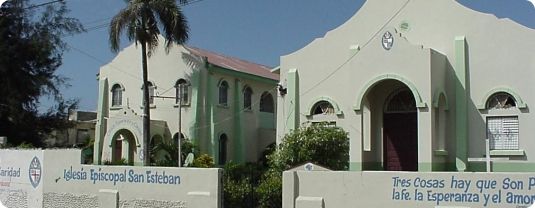The Littlest Promoter – Clinica Esperanza y Caridad

In San Pedro de Macoris, a city in southeastern Dominican Republic, Juana is educating her peers about their health. She is one of many volunteers who are working with Clinica Esperanza y Caridad (Hope and Charity Clinic) and Episcopal Relief & Development to give communities the education they need to stay healthy. She is 11 years old.
Lack of health care resources is a major issue in the Dominican Republic, especially in neighborhoods or “barrios” like Juana’s, where the public health system doesn’t always reach. In partnership with Clinica Esperanza y Caridad, Episcopal Relief & Development is working to provide health services and education to people who need them most.
“With support from Episcopal Relief & Development, the clinic’s program is filling a gap in the country’s health services that the public health system doesn’t currently have the capacity to fill,” said Matt St. John, Episcopal Relief & Development Program Officer.
Over the course of three years, the clinic is training 250 community volunteers as health workers. These health promoters are learning to educate their friends and neighbors about practices to help prevent disease such as hand washing, drinking clean water and vaccinating their children. By providing adequate education, they are influencing people to change their behavior. This will in turn facilitate better health outcomes, especially for mothers and young children, who still have high mortality rates in the region.
Following the basic training, promoters are also receiving more specialized instruction to gain skills in pre-natal and neonatal care; tuberculosis, malaria and dengue fever prevention; screening for cancers that impact women; and prevention of the complications of chronic disease. Other major topics include HIV/AIDS and other STD prevention and family planning.
“The health workers are not only educating their communities. They have also begun identifying other problems that contribute to poor health and working to address those issues,” continued St. John. “In late 2008, promoters began working to staunch domestic violence and alcohol abuse in the region. By challenging the status quo and raising awareness about these issues, the promoters are becoming advocates for health in more ways than one.”
The clinic’s effort to increase awareness is reflected in Juana’s participation in health-promoter training. As health topics became more of a priority for people in her community, Juana’s interest in learning about these subjects grew. When she heard the clinic was looking for a new group of volunteers to participate in training, she made a decision to attend.
“I thought she was the child of one of the promoters at the workshop,” said St. John, after sitting in on one of the clinic’s training sessions. “But throughout the day, she kept raising her hand to answer the questions—she was getting all the answers right.”
While health promoters are usually required to be at least 18 years old, Juana’s persistence convinced facilitators that she was smart and mature enough to handle the responsibility of educating others about these important issues.
“The hope is that Juana will be able to communicate health information on a kid-to-kid basis,” continued St. John. “Her assistance will be invaluable. She can reach younger members in the community and help change their behavior when they are at an age where they adapt easily to new ideas.”


